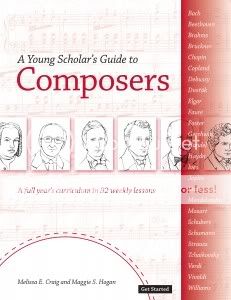
As a member of the This Old Schoolhouse Review Crew I recently had the opportunity to review "A Young Scholar's Guide to Composers", one of the many resources offered by Bright Ideas Press. I was very excited to have the chance to use this in our home as we love music. When we lived in the city we utilized all of the resources that living in the fourth largest city in the United States had to offer and my children will tell you that some of their earliest memories are of evenings spent at the symphony or listening to music at home. What we have not had is a more formal curriculum to actually teach our children about the different composers and we looked forward to receiving this curriculum so we could put it into use. In fact the day it came my older children were lined up asking for their chance to take a look!
The curriculum comes either as a CD-Rom book for $29.95 or a 298 page paperback book for $34.95. IT is designed to be used for an entire year, or 32 weeks of lessons. There are lessons on 26 composers, interspersed with lessons on specific periods of time or genres such as "Music in the Renaissance" or "The Romantic Period". There is a recommended piece of music to be listened to each day of the week. The parents has a lesson to read aloud to their student. The parent is provided with a worksheet to give to their student for the second day of the week's work (complete with an answer key in the back of the book). There are also coloring pages and instructions on creating a folder-book, complete with cards of information for each composer and a timeline on which each composer is written, color-coded to show relationship between the composers, whether friend or musical influence. The resources in the book also include recommended books for further study on each composer, suggestions for a map activity and games. There is a glossary and even a certificate of completion. There are listening suggestions (and links to where you can find the music online) complete with tips to help the student get the most out of their listening such as asking (for List's Les Preludes "How would you describe the mood at the opening of the piece? When does the mood begin to change? Can you recognize some of the instruments as they are played?"
Overall I really liked this curriculum. IT takes the student through a systematic introduction to music history and allows them to gain a familiarity with the most common pieces that they are likely to hear. IT provides a great jumping-off place to do further research. We have a wide range of students in our home, from 12th grade down to preschoolers and this can be used with all ages which we appreciate as we seek to use products with as wide an age range as possible. Everyone can listen to the selections together, the youngest having their coloring pages, the olders studying the composers in light of the period of history that they are studying. We have not had a chance to go to the symphony since receiving this book but when we do go we will be utilizing this book to help prepare our children for the pieces that they will be hearing. As written this curriculum makes a great overview of music history. Additionally it can easily be adapted to complement the history curriculum in use.
The downsides--I would have appreciated having a CD set provided (or at least offered) with the recommended music selections included. I understand that this would likely increase the price considerably and for us it is not difficult to find the pieces right off our shelf but not every one has a sizable collection of classical music in their home and it is so hard to get a full sense of the subtleties over computer speakers!
The second downside is the fact that there are what I feel are some significant holes in the curriculum in their choices of which composers to offer. The authors did make the observation that they were constrained by time; wanting to cover the material in a typical school year. They also referenced the difficulties inherent in discussing individuals whose lifestyles may have been distasteful to say the least. This is a curriculum written for grades 4-8 and there are simply certain facets of lifestyle that are not appropriate for this age. Different families will have vastly different views of how best to approach these difficult subjects. I would have been more frank, using the hard issues as a way to discuss consequences of sin. One example is when it is mentioned that Scott Joplin "became ill with a disease that caused him to lose his mental abilities", spending "the last six months of his life in an "Insane Asylum". Scott Joplin died of Syphilis. Without going into intimate details of how such a disease is caught and how it progresses I'd prefer it to mention the fact that he lived a fairly dissolute lifestyle, dying of a disease contracted as a result of sinful behaviors.
And...as someone who appreciates music and the incredible work of God in a man to enable him to create such incredible experiences through music I have to say that it is stunning to me that they would include Joplin with his debauchery and not include Richard Wagner. That the man was evil cannot be denied. The fact remains that his influence was so deep and profound that to not include him is like trying to teach science without even referencing Darwin or history without discussing Marx or Hitler! The fact that references were made to him in chapters on other composers only muddies the waters further, I think. The man pioneered advances in music that changed the course of music history. I believe that he could have been included in a manner that gave a sense of the scope of his megalomania and self-idolatry without going into the gross details regarding his other issues such as his immorality and extreme antisemitism. Another composer similarly referred to in the text as having had significant influence on other composers yet not actually studied is Mahler. To have not included at least these two composers really makes no sense to me. I understand desiring to present a Christian perspective but I differ in that I believe that one could study a man such as Wagner in a manner that gives the glory for his abilities to God while denouncing the man's sin. If we are allowed in Scripture to "eat meat sacrificed to idols" I fail to see how we cannot enjoy the music of Wagner and study his influence.
I received this curriculum free of charge in exchange for my review.




No comments:
Post a Comment